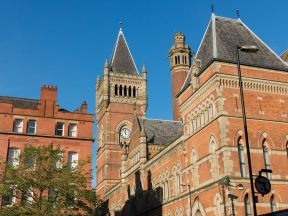The coronavirus outbreak could lead to a fifth of workers being absent, according to the UK Government.
A plan to tackle Covid-19 also stated the virus could cause police to drop low-priority cases and force the NHS to delay non-urgent care.
The 27-page document sets out the UK-wide response to Covid-19 amid widespread concerns about the impact the virus will have on people’s wellbeing, the economy and public services.
First Minister Nicola Sturgeon took part in the UK Government’s Cobra meeting on Monday morning and the action plan was drawn up by the four home nations.
Measures aimed at delaying the spread of the virus could include school closures, “reducing the number of large-scale gatherings” and encouraging greater home working.
Health boards in Scotland could apply for court orders for quarantine and medical examination of those suspected to have coronavirus, the Scottish Goverment said.
A Scotland-specific accompaniment to the UK Government’s plan for dealing with the spread of Covid-19 said health boards have powers to place restrictions on the activities of individuals who are known to have the disease, or have been exposed to the disease, and to prohibit them from entering or remaining in any place.
‘As well as the four nations’ Action Plan published today, we have also published tailored guidance for Scotland’s unique landscape.’
First Minister Nicola Sturgeon
Sturgeon said: “As well as the four nations’ Action Plan published today, we have also published tailored guidance for Scotland’s unique landscape.
“Much of this planning is based on reasonable worst case scenarios which will be refined as our understanding of the virus develops, but it is vital that we are well equipped to deal with all possibilities as this outbreak grows globally.
“We will continue to work closely with the UK Government, Welsh Government and the Northern Ireland Executive as part of a co-ordinated response to this virus.”

The UK Government’s response is in four stages: containing the outbreak, delaying its spread and mitigating the impact of the disease once it becomes established, and alongside that, a research programme is aimed at improving diagnostics and treatment for the disease.
Amid warnings about the impact on the global economy, and with Chancellor Rishi Sunak forced to draw up plans in his Budget to counter the disease, the document acknowledged the potential impact on businesses.
It read: “In a stretching scenario, it is possible that up to one fifth of employees may be absent from work during peak weeks.”
‘In a stretching scenario, it is possible that up to one fifth of employees may be absent from work during peak weeks.’
UK Government
The Government’s response is currently in the containment phase, along with research being carried out and planning for the delay and mitigation work.
Officials hope to delay the peak of the virus until the warmer spring and summer months when health services are less busy.
Once the disease is established, mitigation measures will be introduced which could include:
- Police concentrating on serious crimes and maintaining public order if faced with a significant loss of officers and staff.
- The NHS delaying non-urgent care, with staff rostering changes and calling retired staff back to duty.
- Working with local authorities to deal with the challenge of what could “well be an increase in deaths”, particularly among vulnerable and elderly patients.
- A “distribution strategy” for the UK’s stockpiles of key medicines and equipment such as protective clothing, which will cover the NHS, and could extend to social care.
In a sign that the military could be called in to help with the efforts, the document said there are “well-practised arrangements for defence to provide support to civil authorities if requested”.
The number of people in the UK who have tested positive for the virus stands at 39 with one case in Scotland.
Prime Minister Boris Johnson is launching the Government’s plan in Downing Street, vowing that officials are “ready to take necessary steps” to contain coronavirus and protect the vulnerable.
The strategy includes a “war room” to bring together communications experts and scientists from across Government and the NHS to roll out a public information campaign.
Legislation allowing the Government to use extra powers to help control Covid-19 is expected to go through Parliament by the end of the month.
Health secretary Matt Hancock said on Tuesday that the number of home ventilation kits is being expanded as part of an effort to keep people out of hospitals.
He said: “A lot of people, not least because it is mild, will be best off at home than in hospital, so we are expanding the number of home ventilation kits that are available so that can be done.
“The NHS, of course, has a full plan for this and prepares for this even when there isn’t an outbreak.”
Scottish calls to NHS helplines doubled after the first case of coronavirus in the country was confirmed.
A spokesperson for NHS 24 confirmed there were more than 500 calls made to two advice lines on Monday after a patient tested positive for Covid-19 in Tayside.
On Monday the Sturgeon warned the Scottish Government is expecting a “significant outbreak of coronavirus”, with estimates of between 50% and 80% of the population becoming infected.
Sturgeon said ministers were working to slow the spread of the virus to give the NHS the best possible chance of coping.
The forecasts are based on modelling from the outbreak in China, with Sturgeon seeking to reassure the pubic there are “well-established procedures and protocols in place”.
Follow STV News on WhatsApp
Scan the QR code on your mobile device for all the latest news from around the country



























